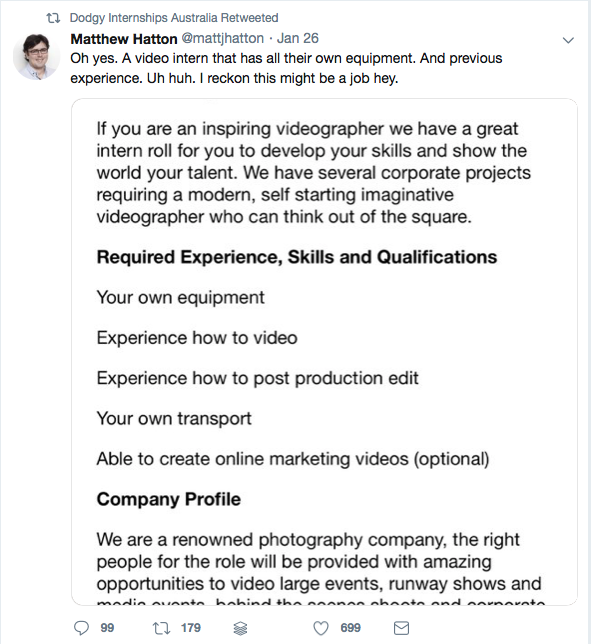Public outcry, political maneuvers and the changing nature of work all suggest that unpaid internships are due for a shakeup.
The time seems ripe for more clarity around unpaid internships. Many aspects of the current system are no longer appropriate, there are still too many examples of exploitation and criticisms are becoming more prevalent.
Those criticisms received a lot of airtime in the backlash to the news.com.au interview with Natalie Brennan, the general manager of Muffin Break, where she blamed the lack of people approaching her company for unpaid internships on the lazy attitudes of young workers.
Changing times
Putting aside the stereotyping, Brennan’s analysis of the changing rate of unpaid internship applications ignores the dramatic changes that have occured over the last few decades. Some of those, such as the decline in union membership (which means employee representation has been weakened) and the rise of the gig economy, are widespread. But many changes are industry specific.
For example, in publishing and journalism the desire for jobs has not decreased, but there aren’t as many jobs available in an industry which has been so disrupted by the digital age generally, and Facebook and Google more specifically. So there are more internships than ever, to the detriment of would-be journalists. Adam Thorn, writing for Mumbrella, makes a similar point, adding, “This swing in the balance of power between supply and demand has meant media owners now choose not to train recruits, and instead expect them to arrive with a journalism degree and also the practical experience of having completed months – or, more often, years – of unpaid internships.”
Another widespread change might be the relative importance of brands. Some of the criticism directed at Brennan levelled the charge that nobody wanted an internship with her company because that company was Muffin Break.
This isn’t necessarily just young people rolling their eyes at a cafe chain, brand value has real effects. Which internship would employers look more favourably upon when considering a hire, Muffin Break or Google? Most people wouldn’t answer, “Depends on what the internship involved”.
While it’s probably always been true that the more prestigious the company, the more prestigious the internship, it’s also true that young people today face a precarious employment situation post-education. If they need their internships to have value a few years down the line, they need it to have brand recognition.
The law
HRM has previously written about the legal risks faced by employers who take on an unpaid intern. As we wrote then: “All internships and work experience programs face legal risks. This is because Australian law maintains a binary conception of employment: an individual is either an employee, and thereby entitled to the full range of employment protections, or not. The current scheme has little room for lesser shades of employment.”
Recently, the Fair Work Ombudsman (FWO) secured a total of over $300,000 in penalties from Her Fashion Box, and its majority shareholder Kathleen Enyd Purkis, for underpaying three workers. According to the FWO press release, one of the employees, a graphic designer who had completed a university degree, was classified as an unpaid intern when she should have been considered part-time employee.
The difficulty with a regime that penalises with this kind of lag time (the unpaid work happened between 2013-15) is that its impact is doubtful. Most larger organisations, with a dedicated HR function and legal departments, are already avoiding exploitative internships. But there are still plenty being offered, mostly from smaller organisations that don’t fully comprehend workplace law. A quick look at the dodgy internships australia Twitter feed will show you that questionable unpaid internships come out at a steady rate.

The situation is such that some political parties are making noises about significant changes to the law. NSW Labor have promised to restrict unpaid internships if they’re elected, requiring businesses that don’t connect their program to a learning institution to pay interns who work for longer than a fortnight.
Different values
Another reason to believe that we’re at a tipping point when it comes to unpaid internships is one criticism that has gained currency over the last decade: that it’s a system that embeds inequality and a lack of diversity into employment. Only so many people can afford to spend months working for an organisation without pay. People from wealthier families find it easier, as do people whose families live in capital cities.
This can be an issue for employers too, as poor diversity has been linked with worse business performance. Research from management consulting firm McKinsey & Company revealed that companies in the lowest quartile of diversity were “29 per cent more likely than the other three quartiles to underperform on profitability”.
Combine all this with the fact that there’s very limited research on whether unpaid internships are actually effective at securing employment for the people that undertake them, and it’s clear that something has to change.
Part of being an effective HR leader is ensuring your staff are treated fairly. Brush up on your legal knowledge with AHRI’s short course “Managing the legal issues across the employment lifecycle”.

